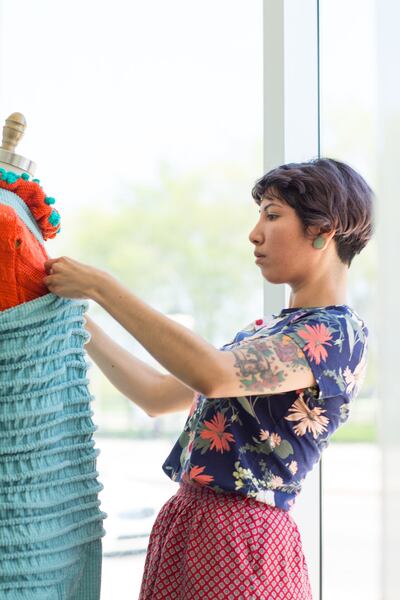
The Business of Fashion
Agenda-setting intelligence, analysis and advice for the global fashion community.

Agenda-setting intelligence, analysis and advice for the global fashion community.

CHICAGO, United States — On an urban campus situated on the South Loop of the city sits Columbia College Chicago, a creative, liberal and media arts college that offers a BA in fashion studies with concentrations in either merchandising or product development, and a BFA in fashion design.
Two years ago, Columbia College underwent a macro-curricular overhaul, during which the fashion department renovated its programmes following a year of research. Now, students, whether following a product development, design or a merchandising pathway, are taught to understand the fashion ecosystem in a comprehensive, twenty-first century way — with digital potential and the interconnectedness technology creates between skills.
Building on its traditional reputation as a school built on practical learning taught by leading industry practitioners and strong relationships with leading fashion businesses, Columbia College teaches some classes on location in the city, including visual merchandising classes at major department stores and display windows that our students populate with work on Michigan Avenue.
BoF sits down with Dr Colbey Reid, chair of Columbia College Chicago’s department of fashion studies, to discuss the school’s approach to future-proofing its fashion curriculum, changing perceptions about the quintessential fashion student and drawing academic inspiration from the windy city.

Student at Columbia College Chicago | Source: Courtesy
How would you describe the DNA of the fashion department at Columbia College?
Columbia College Chicago historically started as a place where students could come to study with academics who were also industry practitioners. It was more of an apprenticeship model and while the institution has changed, that philosophy hasn’t. We’re part of an institution where industry connectedness is ingrained in its DNA.
How has the fashion department changed with the curriculum overhaul?
My department redesigned everything so that a student in fashion, whether following a product development, design or a merchandising pathway, can understand the fashion ecosystem in a comprehensive, twenty-first century way — to think about the future our increasingly digital world is leaning towards.
We created core classes around that concept, which all students follow together, and then concentrations for the different interests so that students learn how to use the most cutting-edge software and the forms of big thinking that attend to that. For example, a digital pattern making and construction class in product development will use a software that allows for 3D imaging, but that software also has profound implications for merchandising as you can make 3D merchandising mock ups. This education isn’t just about being tool-centric, it’s about learning the concepts affiliated with the tool.
In what ways is industry connectedness reflected in the curriculum?
We offer classes on location in the city, including visual merchandising classes at department stores Neiman Marcus and Bloomingdale’s previously. We also have classes partnered with start-ups and major brands, including a series of seminars with industry representatives to talk about how they’re using aspects of new technology in their practice. Last spring, we had merchandisers at Target talk about how 3D software has revolutionised their practice. We also had Google and Levi’s discuss their collaboration in designing a denim jacket linked to your smartphone.
In January, we are also launching our Fashion Lab, which is an academic industry partnership organisation with major brands and Fortune 500 companies for which we will custom design projects every semester that are their executives’ hardest problems and questions. A four-person student team will learn the research methodologies that will help them analyse and report data, generate managerial solutions and try to solve that problem.
How does Columbia College prepare students for their career?
We want our students to not just be ready to work at a Chanel or a Macy's, but also at a Google or an IBM, a hospital or a pharmaceutical company. We have integrated throughout the curriculum digital, wellness and health savviness, allowing our students to go to a traditional fashion space or one of these emerging fashion spaces.
Our students are different and are putting pressure on the quintessential fashion student.
We offer our students a robust approach to the discipline so that they have the weight to move into adjacent industries. Given that one of the major changes in the industry is the advent of wearable technology and textiles, a student trained in the emerging future of fashion should be able to work in high tech — but with additional training in fashion history and theory to enable deep thinking about the industry.
We also have a really great careers service, which works in close connection with our department. They regularly ask us which brands our students care about, or what types of events our students want, and set up internship recruiting events and portfolio review events, for example.
How does Columbia College off-set not being in a fashion capital?
Chicago is a gritty place and we are located down town, in the heart of the city. This grittiness gives a particular flavour to our institution and to our approaches. For example, when we’re talking in a special topics class about blue collar fashion, we’re doing something real and immediate that is relevant for our students in this urban space. Chicago is the perfect place for our off-beat approach to the discipline. We are not doing a version of fashion where Chicago is the pale imitation of New York; we are doing a version where Chicago is at the centre of it.
Last spring, we had a hack-a-thon on the topic of design, safety and risk. We invited students from fashion and other disciplines to collaboratively think about questions like, “What are the forms of risk that come with the city?” and then design objects around those questions to solve them. Other cities have those questions and problems, but they don’t want to showcase it — in Chicago, we own up to the fact that these problems exist, and we are interested in grappling with them.
What kind of student does Columbia College draw?
What differentiates our programme to one in, say, New York is that our students are different and are putting pressure on the quintessential fashion student. Many are passionate about understanding the body and what a body means, and they care deeply about emerging market spaces, like sustainability, inclusive sizing or prosthetics.
There is great research and thinking in the academy that is challenging the idea of fashion capitals in the twenty-first century in the first place, showing the emergence of global fashion hubs all over the world. There are lots of ways in thinking about the interface between disability and fashion, or marketing to a population that is gender non-conforming, or to think rigorously and actionably about sustainability, which are big points of inspiration at our institution. Somebody who doesn’t have a strong environmental, social or cultural consciousness probably isn’t going to be happy or do particularly well here.
Our students are also hands on learners who really like rolling up their sleeves and don’t need everything cookie cutter on a power point slide. We strongly emphasise our industry partnerships and problem-based learning, going out into the city and having an experience that you bring back to your learning environment. Somebody who isn’t comfortable with that hands-on approach would struggle here.
From analysis of the global fashion and beauty industries to career and personal advice, BoF’s founder and CEO, Imran Amed, will be answering your questions on Sunday, February 18, 2024 during London Fashion Week.
The State of Fashion 2024 breaks down the 10 themes that will define the industry in the year ahead.
Imran Amed reviews the most important fashion stories of the year and shares his predictions on what this means for the industry in 2024.
After three days of inspiring talks, guests closed out BoF’s gathering for big thinkers with a black tie gala followed by an intimate performance from Rita Ora — guest starring Billy Porter.